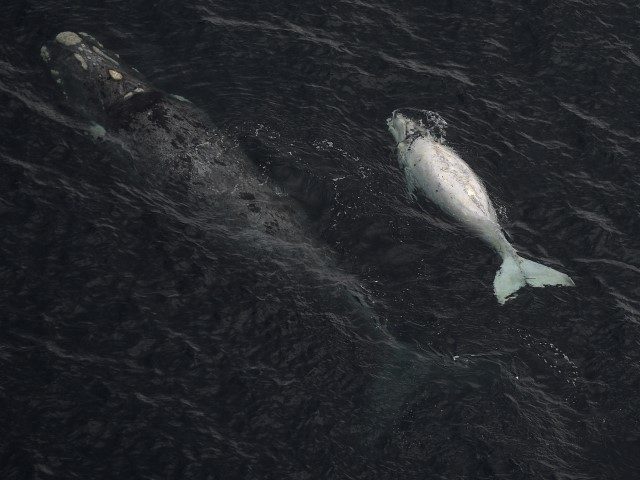A Southern right whale and its calf made an extraordinary journey of more than 6,200 miles from South African waters to the coast of Argentina, reportedly marking the first time the species has been documented making the journey.
Last October, the Mammal Research Institute (MRI) Whale Unit at the University of Pretoria in South Africa conducted a “photo identification aerial survey between Nature’s Valley and Muizenberg” on the country’s southernmost coast to assess the Southern right whale population inhabiting the waters, the Cape Times reported. The survey documented 414 whales.
The same month, researchers tagged four female whales in Walker Bay “as a pilot study to investigate, in detail, the migration and feeding behaviour of these animals,” the MRI said.
One of the four Southern right whales tagged swam more than 6,200 miles (10,000 kilometers) with its calf across the Atlantic to the Argentinian Coast, according to the Cape Times. Its tag stopped emitting a signal in mid-December before coming back online on April 19.
Research Manager Els Vermeulen with MRI’s Whale Unit said such a voyage has never been recorded, according to the Cape Times:
This is unprecedented and has never been recorded so it exceeds all our expectations as researchers, the reason why this might be happening is because in the South African population we have been seeing strong changes such as changes in migration of where they go feed, a substantial decrease in body conditions of the females, they were getting skinnier and taking longer to reproduce, so instead of having a calf every three years they are giving birth every four to five years.
Vermeulen said the unexpected voyage brings about the hypothesis that the whale may have ventured to South American waters in search of food, adding that climate change may be responsible for a diminished food supply in its native waters, the Cape Times noted.
The researcher said the next mystery is whether the whales come back to South Africa.
“We are very much in need to get more data and more animals tagged because in the history of Southern right whales in South Africa, only ten have been tagged and this is the first one that shows this kind of behaviour,” she told the Cape Times.
“More satellites need to be placed on whales to understand if this occurs frequently or just a random act, just because they are not endangered does not mean we should not be concerned, we need to keep an eye on them,” Vermeulen noted.
Southern right whales can grow to between 43 feet and 63 feet in length and weigh up to 176,000 pounds, the National Oceanic and Atmospheric Administration (NOAA) reports. They are found throughout the waters of the southern hemisphere between longitudes of 20 degrees south and 65 degrees south. The species “is listed as endangered under the Endangered Species Act and depleted under the Marine Mammal Protection Act,” according to the NOAA.

COMMENTS
Please let us know if you're having issues with commenting.